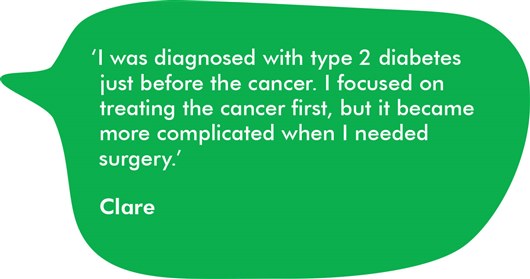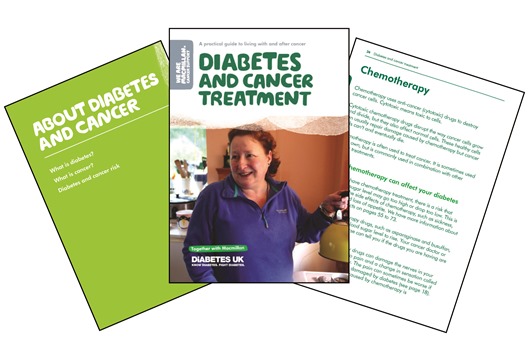This week is Diabetes Awareness week. About 1 in 5 people with cancer also have diabetes. Managing diabetes while undergoing cancer treatment can be particularly challenging. In this blog, content channel editor Tania talks about the ways in which cancer can impacts diabetes, and how to manage the two conditions.
Diabetes is a condition where there is too much sugar (glucose) in the blood. The amount of sugar is usually controlled by the insulin, a hormone made in the pancreas. Having diabetes means the pancreas doesn’t produce any insulin (type 1 diabetes), or not enough (type 2 diabetes).
The aim of diabetes treatments is to keep the amount of sugar in the blood as normal as possible. However, this can be more difficult to manage while having cancer.
Cancer can affect diabetes in different ways:
How to manage the two conditions
Being diagnosed with cancer can be overwhelming, and put everything else in second place. However, it’s important to manage the two conditions together.

Here are three important steps to take:
Short-term changes in blood sugar don’t usually have long-term effects, but very high, or too low, blood sugar should be avoided. Maintaining a healthy life-style can help you keep your blood sugar at normal levels, and improve general well-being.
If you want more information on diabetes and cancer, have a look at our booklet Diabetes and cancer treatment, produced in collaboration with Diabetes UK. It has tips on how to manage the two conditions, as well as ways to cope with the side effects of cancer treatment.

For more information about diabetes, you can contact Diabetes UK. Call their helpline free on 0345 123 2399 if you live in England, Wales or Northern Ireland. Or call 0141 212 8710 if you live in Scotland. It’s open Monday to Friday, 9am to 6pm. Or visit diabetes.org.uk
To see what else Macmillan's cancer information team has been blogging about, please visit our blog home page! You can subscribe to receive our blogs by email or RSS too.
We're with you every step of the way
The Macmillan team is here to help. Our cancer support specialists can answer your questions, offer support, or simply listen if you need a chat. Call us free on 0808 808 00 00.
Comments? Feel free to add them below (you need to be logged in).
Keep in touch Follow Macmillan’s cancer information team on Twitter @mac_cancerinfo
Whatever cancer throws your way, we’re right there with you.
We’re here to provide physical, financial and emotional support.
© Macmillan Cancer Support 2024 © Macmillan Cancer Support, registered charity in England and Wales (261017), Scotland (SC039907) and the Isle of Man (604). Also operating in Northern Ireland. A company limited by guarantee, registered in England and Wales company number 2400969. Isle of Man company number 4694F. Registered office: 3rd Floor, Bronze Building, The Forge, 105 Sumner Street, London, SE1 9HZ. VAT no: 668265007